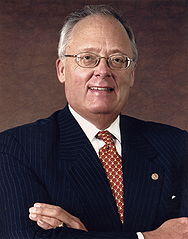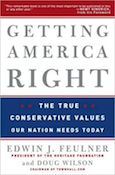Getting America Right: The True Conservative Values Our Nation Needs Today
As jealous liberals have come to realize more and more, the modern conservative movement owes much of its vitality and success to the careful, imaginative intellectual work of a small platoon of think tanks that began to proliferate in the 1970s. These organizations of scholars, researchers, and practitioners nurtured conservative ideas, brought them into the political mainstream, and helped put them into political practice. Among their most important achievements was to bring to light the constitutionally disastrous tendencies of the modern administrative state and to formulate alternative policies consistent with free government.
One of the pathbreaking products of these efforts was the Heritage Foundation’s Mandate for Leadership, a thousand-plus-page manual presented to President Ronald Reagan upon taking office (and updated several times in the next quarter-century). With that bold compendium of reforms, conservatives proved that they were not content merely to criticize liberal programs; they were ready to govern. Headed by Edwin J. Feulner, Heritage continues to shape debates in Washington, D.C., and to cultivate the next generation of conservative policymakers. In addition, Heritage was instrumental in creating Townhall.com, an online forum for conservative opinion, information, and discussion that attracts younger conservatives. The website became independent last year, but Feulner has teamed up again with Townhall chairman Doug Wilson to write Getting America Right: The True Conservative Values Our Nation Needs Today. The book is a spirited call to action, extending their argument for limited government beyond the Beltway to the American public.
Feulner and Wilson begin with a typical conservative question, “Where did things go wrong?” By “wrong” they mean: how has a government established to secure our natural rights become a government that spends $1 million restoring an uninhabited Alaskan island, or $3 million on Virginia horse trails? The examples of political mischief multiply until a vivid picture emerges of a government that has lost the ability to discern its rightful purposes.
The book is organized around six questions that the authors believe Americans should ask whenever their government acts: (1) “Is it the government’s business?” (2) “Does this measure promote self-reliance?” (3) “Is it responsible?” (4) “Does it make us more prosperous?” (5) “Does it make us safer?” and (6) “Does it unify us?” With an effective mix of data and with choice quotations from the American Founders, Lincoln, Churchill, and others, Feulner and Wilson elaborate on these benchmarks and show how some government programs like the Homestead Act, the G.I. Bill, and the 1996 Welfare Reform Act meet these basic criteria. They also catalogue several ways in which both Democrats and Republicans (including, sometimes, President Bush) have failed to honor them. In the end, it is not enough for government to “move” whenever people are hurting if moving means waste, fraud, and reducing citizens to clients of an unlimited welfare state.
In the spirit of Ronald Reagan, the authors are cheerfully optimistic that the American people remain basically united around sound conservative political opinions. Occasionally, Feulner and Wilson veer into populism, declaring that “a free society is best guided from its grass roots” and “as federalists, we aim to keep decision-making as close to the people as possible” (not quite what Publius had in mind). Besides, conservatives seeking guidance from the grassroots may have their work cut out for them. Whatever their personal values, too many Americans seem already to have made their peace with the unlimited modern state and what it can do for them. (For a hilarious example of this dependent mentality at its worst, the book includes a transcript of a 911 call to remedy a complaint over a fast-food deluxe cheeseburger.)
Getting America Right does not pretend to address all of the current political challenges that conservatives need to face. There is no discussion of important cultural issues like biotechnology, abortion, or gay “marriage.” Feulner and Wilson catalogue some of our elected representatives’ diddlings over defense bills, but do not consider ballistic missile defense or attempt to define the proper scope of American foreign policy. They address immigration policy, but primarily to show how bureaucracy undermines the honor that used to attach to citizenship. Nevertheless, the political war of ideas has many fronts and the aim of this book is to focus attention on the overarching need to restore energetic, constitutional government.
At the heart of this primer is the practical wisdom to “apply old ideas to new circumstances.” In particular, the authors call for a “return to core principles…grounded in our founding document, the Declaration of Independence.” Conservative think tanks and journals have increasingly recognized in recent years that it is not enough for government to be compassionate, or traditionalist, or libertarian. Good policy will become true statesmanship only when it is rooted in the distinctively American political tradition of natural right. Conservative policies planted in that rich American soil will endure. In an epilogue, Feulner and Wilson remind their readers how much our forefathers sacrificed for these principles, both in the founding generation and in the Civil War. Getting America Right calls on Americans to renew our devotion to them once again.
Book Review from The Claremont Review of Books, by John B. Kienker
Tags: Edwin Feulner, Getting America Right: The True Conservative Values Our Nation Needs Today
- The Author

Edwin Feulner
Edwin J. Feulner’s leadership as President of The Heritage Foundation has transformed the think tank from a small policy shop […] More about Edwin Feulner.
- Books by the Author
- Related Articles

Ed Feulner Endorses the Conservative Book Club!
Longtime Heritage Foundation President and conservative icon Ed Feulner has endorsed the Conservative Book Club!
















